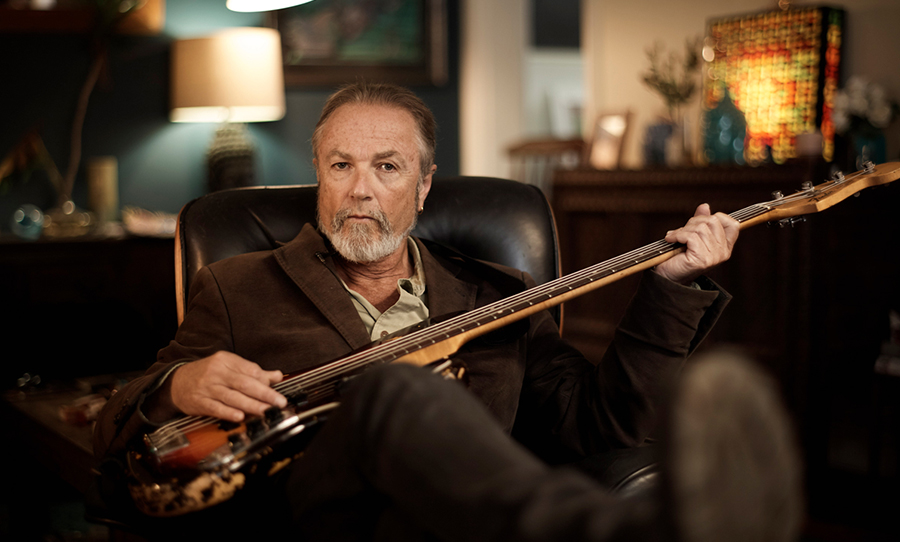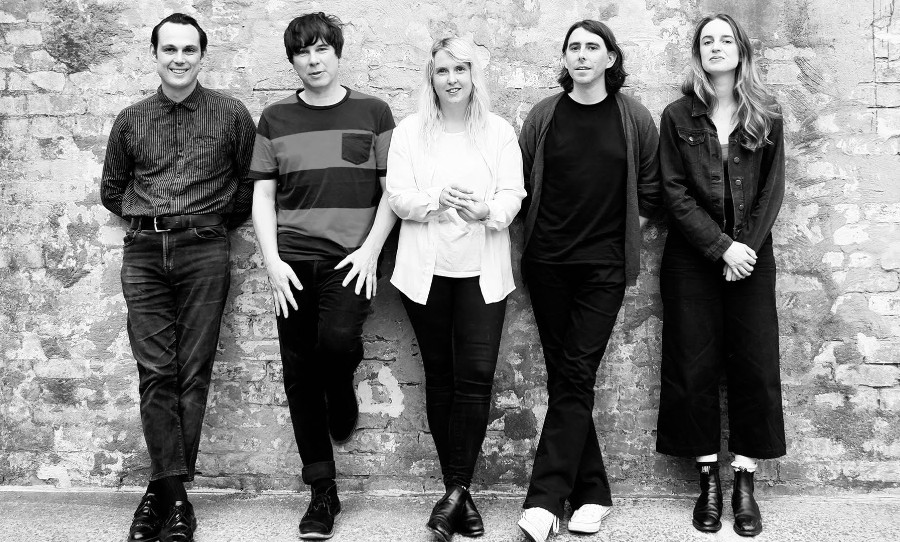This article appears in print in Happy Mag Issue 9. Grab your copy here.
Sometime in the 1980s, a young Steve Kilbey was strolling down the corridors of EMI. Beside him was a record executive, a gentleman who had taken The Church’s frontman under his wing. Whether he had an inkling, or not, that this meeting was important. It had a purpose and upon reaching their destination it became clear.
Veered into a side room Kilbey was beckoned to bear witness to something, a breakdancing man. The exec then proceeded to play Steve a song. It was Spandau Ballet.
Then came some advice, words which have to this day impressed heavily upon Kilbey’s mind. They went something to the effect of this. “You’d better get across this mate or you won’t have a career!” He didn’t. Get across it that is. The Church weren’t ones for embracing the zeitgeist.
Did Kilbey have a career? Well yes and no. Yes, in these sense that The Church continue to this day to be one of Australia’s most enduring and iconoclastic outfits. No because Steve probably wouldn’t want you calling it that. Music was always his escape.
But wheeling back to The Church. While it may have hurt wallets and undercut more than a few industry careers, the group’s mission was always a simple one. They were keeping the flame alive for those who had come before them. Figures who, more than simply opting to chase the of-the-moment fabrications of the present, were intent on making something more. These were individuals who saw music’s most potent of potentials and their dedication was total. They were sincere on advancing the art.
Many amongst The Church’s idols were sixties forbears. Kilbey was inspired by psychedelia no question and his work with The Church reflects that. But as this old raconteur puts it by the time fifth album Starfish rolled around his group had grown into something else. Like many great acts, they pushed past their inspirations to the point where trappings of the genre were of little concern. To those they’ve so deeply influenced they’re a genre unto their themselves.
While this long-running outfit is soon to be firing off again in lieu of their iconic album, Starfish’s, 30th anniversary, Kilbey’s current preoccupation lays elsewhere. In a matter of days, he’ll be stepping into Michael Stipe’s shoes to pay homage to iconic janglers R.E.M. in a series of shows titled The Ones We Love.
Did we say preoccupation? With the tour fast approaching Kilbey confesses to very little occupation at all. He’s always been a little sly in that regard, so it might not be too much of surprise to learn that the raconteur is withholding all and any practice to the very last and possible minute.
But there’s more. He’s never even been that jazzed on the band to begin with. Wait, what? It’s public knowledge he assures. And maybe it’s even a little understandable given that both R.E.M. and The Church were so often lumped together by the music critics of the 1980s.
Yet he’s still enticed? Look, yes but maybe you should hear it in his own words. Trust us he’s never short.
So without any further delay we present to you the man himself. Kilbey will, if you can give him half a moment, lay his reasoning before you. After a lengthy exposition upon the history of psychedelia of course. Naturally, we wouldn’t have it anything less.

Chatting to The Church’s Steve Kilbey about the nature of psychedelia, being a classicist and The Ones We Love – an upcoming tour where he’ll be playing the songs of R.E.M.
HAPPY: So Steve, we’re here to have a chat about the upcoming R.E.M. tribute show plus more.
STEVE: Let’s just move on to the plus more!
HAPPY: Well, we’ll talk about a bit of both!
STEVE: Okay.
HAPPY: It’s not too difficult to make an association between R.E.M. and The Church. In a sense both were outsiders battling against what you’ve previously termed “the ridiculous zeitgeist of the 1980s”. Do you see the two bands as being connected?
STEVE: Um no, I think we’re more like two people walking down a street. And we’re both walking down the street but there’s no connection between us at all. I don’t think there’s – people have always tried to find a similarity. Oh, good luck if they do! But I don’t see much…
Except yeah, they were both kind of sticking to these classic values in their music. They weren’t going for the 1980s jive. They weren’t having synthesisers and drum machines. But other than that, I don’t think there’s really a lot of connection between us, that I feel anyway.
HAPPY: What is it about that period, the 1980s, which made people feel such a disconnect from popular culture? As you’ve just said what The Church and R.E.M. were doing was different but fundamentally both didn’t want to be playing what was on the radio…
STEVE: Well, I think that in any art movement at any time – not just in art movements but in any theological or philosophical movement – there are classicists that like the values that were being used during the golden age of… The Whole Thing!
I guess if you’re a rock ‘n’ roll classicist you’re talking about the kind of attributes that The Beatles had. And Dylan and The Stones and Bowie and Hendrix. You’re harking back to that era, you want your music to sound like that. You want it to be delivered like that. You want the whole attitude! To be like that, like those guys did.
The Beatles did everything and then sort of imploded by 1970. Everybody else basically hung around doing things like taking one of their songs and kind of just doing that forever. For the first time in the ‘80s – actually, I guess it was with punk rock. Punk was the first real reaction against that. So punk rock is sort of like Dadaism against the Romanticism or whatever. It’s sort of like going, “We’re going to stop this! Stop people adhering to classic values. We want to introduce chaos!” It was music that non-musicians could play.
And I guess that kept on developing into new wave and the New Romantics, that sort of stuff that we had at the beginning of the ‘80s as exemplified by people like Spandau Ballet and the Thompson Twins. The ‘bmp, bmp, bmp, bmp, bmp, bmp–bmp’ synthesiser. And you know that’s their right, good luck to them! Whereas me, after dabbling in everything – when we put The Church together I never sat down and actually said this to them all but just intuitively we went for classic values. We wanted our music to sound like and be like The Beatles, The Stones, Hendrix and Dylan. We wanted that! That kind of feeling.
And that’s why it was frustrating when you started working with people who didn’t want you to have that. They were trying to make records with great big snare drums and synths. Those handclap machines! You know a guy took me into his office once at EMI and showed me a guy doing breakdancing for the first time. Then he showed me Spandau Ballet. He said, “You’d better get across this mate or you won’t have a career!” You know!?
But the one good thing about being a classicist is that you can never go out of style. If you can paint like Leonardo Da Vinci you’re never going to go out of style. You may not be the most modern, wonderful, wow, wiz-bang thing but always people will be able to come back to it and go, “That’s a great painting!” Because you’re painting with classic values.
Our rock ‘n’ roll? We just have classic values. And R.E.M. have classic values. They started off and went, “No fuck that, we just want to be a rock ‘n’ roll band. We want to sound like Creedence Clearwater Revival! We don’t want all that hoopla and malarkey on what we do!” So in that sense, there’s a similarity. But you know when you really look at it very carefully it’s not very similar at all. I thought there was some really lazy journalism when people, especially in America where they hadn’t heard of The Church, were saying we were influenced by R.E.M. Very funny!
HAPPY: You talk about some of these things in your book, Something Quite Peculiar. I don’t want to give too much of it away to the readers but there’s a great quote where you say, “The Church pioneered psychedelia mark II, though my pride in this fact is tempered by the knowledge that much of what we did was enormously influenced by The Beatles and The Byrds and Dylan.” And it’s true. There’s a good case to be made that you really were the first, as some people would put it, neo-psychedelic act…
STEVE: Yeah, yes.
HAPPY: But psychedelia is a difficult concept to pin down. What is it about music that makes it psychedelic?
STEVE: It puts you into another state. Its nature is of transcendence. For example, AC/DC are the most unpsychedelic, untranscendent band you can get. Its obvious, primal sort of. “I’m gonnaaa root yooou all night lonnng!” That’s not psychedelic! Psychedelia is, “Nothing I see is in my tree/I mean it must be high or low.” And sort of cellos going [Imitates backward cellos]. And mellotrons and jingly jangly guitars! It’s sort of trippy you know? It’s like AC/DC’s music to have a beer to and The Church and The Byrds and The Beatles is music to have Ayahuasca or acid or DMT or STP or mescaline to! You know what I mean? It’s like what do you want with your music?
The Beatles were so amazing. Sometimes they hit it all at once. The feet, crotch, head and heart – all at the same time! Psychedelia is music for the mind. It’s escape, escapism. That’s how I see it, but some people see psychedelia as adhering to a way of dressing, certain guitars and having a pudding bowl haircut. Having a paisley shirt.
There were lots of bands, especially in Australia and America, that came along in the wake of The Church that had a paisley shirt, a Rickenbacker guitar and a pudding bowl haircut that were certainly not-fucking-psychedelic in any way at all in my humble opinion.
It’s very much a misunderstood term, an umbrella term. So if I meet someone and they say to me, “My band is a psychedelic band.” I’m still none the wiser as to which bit they’re getting at.
And now there’s ‘psych rock’! Which is sort of like psychedelia with sort of something nasty thrown in isn’t it? It’s like acid mixed with bad speed or something!
HAPPY: Well it doesn’t seem to be in the same vein as what people were doing in the ‘60s or even what you were doing in the ‘80s…
STEVE: No.
HAPPY: Often it can kind of get conflated with other styles from the same era or different periods that might not have been related to psychedelia at all.
STEVE: You’ve got a very good vocabulary. Conflated. That’s a good word! I’ve never heard a journalist use that ever before. That’s really good, that’s very good. I’m impressed.
HAPPY: Hah!
STEVE: Yes conflation. Not inflation, conflation. That’s what’s sort of happened and we have to have these terms so we can talk about it. But I’m not exactly sure. We sort of drifted into it. When people started saying in the beginning, “Oh, you’re a psychedelic band!” We went, “Oh! Are we? Oh, we are. No, we are, yes, we definitely are! Let’s.” It was so hard because when you start off a band it’s so confusing. “What are we going to be!?” Some bits of it aren’t quite figured out. It would have been so hard to sit down in 1980 and say what The Church was going to be and then pull it off.
You sort of start off and have this air of knowing what you’re doing and then as things fall into place people go, “Ah! Wow! You’re psychedelic!” And you go, “Ah yeah! Wow, we are! I’m going to get a paisley shirt and get a paisley bass. I’m going to adopt some of these outward accoutrements of psychedelia!”
And you sort of drift along opportunistically waiting for things to happen. However, by the time we get to Starfish it’s not really so psychedelic then I don’t think. It’s sort of like we’d outgrown those trainer wheels that were holding us in place. We’re psychedelic, and then suddenly we’ve turned into ‘The Church’. And then people were influenced by The Church because then The Church had its own thing. It had really kind of outgrown psychedelia.
I still like psychedelia. But I think psych rock is like fast and nasty. Psychedelia had fast and nasty, but it also had slow and strange. That’s really the side I like and there really aren’t that many songs. There’s Eight Miles High and there’s Strawberry Fields and I Am The Walrus. Like all great movements, there are only five-to-ten absolutely amazing songs.
The rest of them – well it’s like punk rock or grunge you know? There’s like five great punk rock songs, five great grunge songs, five great New Romantic songs and then all the rest of them are just pastiche or trying to or songs where people are trying to rewrite their one great song. This is sort of my speciality, all this stuff. Where it all came from and where it’s all going…
HAPPY: I know and it’s great! But I think we might get in trouble if we don’t at least make some mention of The Ones We Love! What can fans expect and how have you gone about breathing life into these songs?
STEVE: Well the first rehearsal is on Sunday..
HAPPY: Oh, okay!
STEVE: I became a musician because I’m lazy and irresponsible and I don’t like to do anything! So probably on Sunday morning about two hours before I get to the rehearsal studio I’ll be listening to the songs I’m supposed to be singing and trying to learn them. But I treat my own career like that!
When I sing a song with The Church its like we write the music and then someone will go, “Alright, can you come down to the studios because we’re about to do vocals on this?” And I turn up, smoke a joint, take the backing track and then and there I write the vocals. So I’m going to do the same with R.E.M., the same that I do with all of it. I will wait to the last moment until the time will make me do it. I’ll figure it all out then and trust in the process that it will work!
It’s kind of interesting. The reason I’m doing it – I’m not a huge fan of R.E.M. and everybody knows that! But neither do I hate them! I’m neutral! Imagine an actor who always plays a villain and he knows the parts he likes to play. Then one day someone rings up and says, “Hey how would you like to play a hero? How would you like to play a neutral character?” And you go, “Yeah well that’s really interesting!”
I can test out my musical skill on this role and I hope I learn about R.E.M. I hope I get a new appreciation. I hope I can bring myself into this. I hope I can sing in Michael Stipe’s key! He’s got a much higher pitched voice than me so it’s not going to be quite so easy. So it’s a challenge, man! It really is.
HAPPY: Well we’re running short of time but just one last quick question. You have this big Church tour coming up as well. What can fans expect from Steve Kilby in the coming months?
STEVE: Well okay, there’s R.E.M., I’m doing Melbourne Writers Festival, I’m doing a solo show in Sydney and then The Church are going to America for Starfish’s 30th Anniversary Tour. We’re doing it in England too then coming back to Australia and New Zealand to do a show which will be Starfish in its entirety then an intermission and then we’ll be coming back for our regular sort of set which is a smattering or oldies, newies and all kinds of things. So a two-hour show when do that in Australia in November and December!
HAPPY: Brilliant! Well good luck with that and thanks for having a chat!
STEVE: And you know what? Seriously, I’m not pulling your leg, congratulations on having a good vocabulary because most people I talk to these days are fucking philistines! Okay? See you later!
This article appears in print in Happy Mag Issue 9. Grab your copy here.


